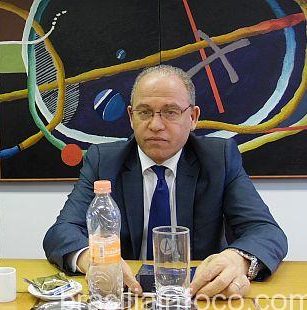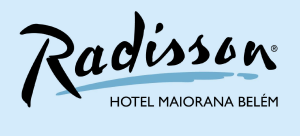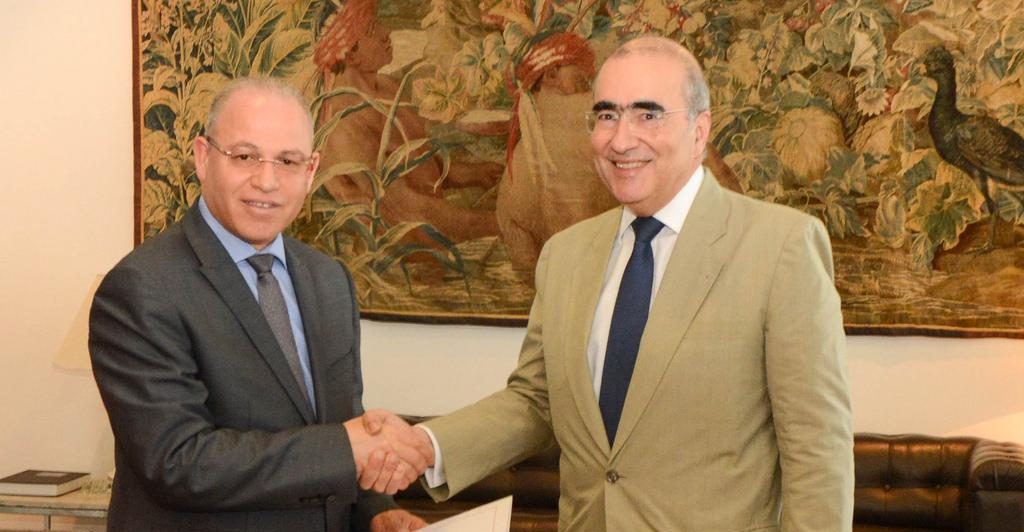
1-Tunisia and Brazil diplomatic relations:
Since the establishment of diplomatic relations in 1956, Tunisia and Brazil have had excellent relations and a closer ties in different domains of bilateral cooperation. the Tunisian Embassy in Brasilia was opened in 1989 and the Brazilian Embassy in Tunis was opened for the first time in 1961. The two countries have signed in 1990 an agreement establishing the Joint Commission. Since then, 3 Meetings of Joint Commission have taken place, in 2001, 2006 and 2017 with the aim of reviewing the ongoing programs of cooperation, and examining the ways and means to strengthen bilateral relations. During the last two years, High-level Visits have been frequent and have created a solid foundation for our bilateral cooperation to develop. I would like to mention, in this context, that in April 2017, the Tunisian foreign Minister H.E Mr. Khemaies Jhinaoui visited Brasilia to preside over the third join commission with his Brazilian counterpart while H.E. Aloysio Nunes visited Tunisia recently on the 20th of July 2018. Many other visits took place from both countries during this period such as the visit of the Tunisian Minister of Defense (in April 2017), the Tunisian Vice Minister of Agriculture (in march 2018) and the Tunisian Vice Minister of Foreign Affairs (in April 2018), and the visit of the undersecretary of the Brazilian Ministry of External Relations in charge of Africa and Middle East to Tunisia, on 24 April 2018, on the occasion of 3 rd session of the political consultations between the two countries.
2- what are the main products exchanged between Tunisia and brasil
Let me first admit that the trade volume between the two countries is below our expectations and the existing potentialities. Tunisia is the 8th main destination for Brazilian exports to Africa and 9th to the Arab world. The bilateral trade volume in 2018 has shot up by 20% to reach almost 260 million USD. Whereas Brazil exported café, sugar and seeds oil, worth 250 million USD, Tunisia exported olive oil, dattes (Tamara) and chemical products, worth 9 million USD. It is quite obvious that the commercial balance between the two countries is strikingly in favor of brazil. In that regard, we strive to diversify and promote Tunisia’s exports in brazil, attract foreign investments and promot tourism. I would like also to stress that our bilateral cooperation has good prospects for being developed and consolidated with a focus on areas such as agriculture, technology, poverty alleviation, social inclusion, scientific research, and good governance, among others. 3/what are the projects and future plans between Tunisia and Mercosul
As part of its policy to promote its trade and diversify its economic partners, Tunisia has signed a number of preferential bilateral and multilateral agreements: • A bilateral agreement establishing a free trade area with Turkey, Libya, Egypt, Morocco, Jordan and Iraq, A Free Trade Area Agreement with EFTA countries, The Agadir Free Trade Agreement between Jordan, Egypt, Morocco and Tunisia, An agreement establishing the Pan-Arab Free Trade Zone with 18 countries of the League of Arab States. Moreover, Tunisia is the first Arab country to sign the Association and free trade agreement with the European nion, that was in July 1995. In 2012, Tunisia became an advanced EU partners which grants Tunisia commercials benefits. In the meantime, the negotiations towards the signature of a Deep and comprehensive Free Trade Agreement (DCFTA) are currently underway to ensure the progressive integration of Tunisia in the internal market of the EU and to build a Common Economic Space. Tunisia is also a member of the Common Market for Eastern and Southern Africa (COMESA), the largest regional economic organization in Africa with 21-member states, and more than 500 million inhabitants. In that spirit, Tunisia started the first round of negotiations in order to establish an FTA with MERCOSUL in November 2017 in Brasilia. We are currently looking forward to organizing the second round in Tunis, the Tunisian capital.
We are, as Tunisians, strongly committed to conclude the negotiations as soon as possible, and to sign the agreement establishing the FTA between the two parties. Such a framework will undoubtedly pave the way for further economic cooperation and offer more economic opportunities for both Sides.
3-Tunisia is a country that has French as spoken language can you inform our readers about the facilities to study French languages in Tunisia.
First of all, I would like to tell you that the official language in Tunisia is Arabic and the French is the second language and it’s commonly used in my country. In Tunisia we have « Institut Bourguiba pour les Langues Vivantes » known as « Bourguiba School » and took the name of our first President after Independence late Habib Bourguiba. This institute provides academic
courses of many languages and offers special sessions for foreign diplomats and nationals to learn Arabic and French, particularly during summer time. I seize also the opportunity to extend my call to the
Brazilian students interested in learning Arabic or French and willing to discover the oriental culture to visit the website of this institution “www.iblv.rnu.tn”, where they could find all the details about programs and how to subscribe to the course. I would like also to add that Tunisia host yearly an increasing number of foreign students in particular from African countries to pursue their higher education and vocational training in many specialties in public and private universities and schools. In this regard, we are working with the Brazilian side to develop this promising area of cooperation. 5/ Legal framework and new agreements and MoUs to be signed between Tunisia and Brazil Many agreements were signed between the two countries during the las few years in various fields such as economy, youth, science and
technology and trade. Actually, we are working closely with “Itamaraty” to conclude the negotiations of many others projects of agreements, to be signed in the coming year during the next bilateral meeting, in the field of education,culture, sport, investment (ACFI), customs, transportation and social affairs.
4-Any comments about Tunisia Politics and Democracy; i am sure that our readers want to know more about your country
As you know, Tunisia witnessed in January 14 th , 2011, a popular revolution that put an end to 23 years of presidential dictatorship regime. This revolution was a powerful expression of Tunisians' desire to have their voice heard in the economic and political life of their country. Since then, Tunisia has adopted new constitution in January 2014 and held on 26 October 2014, the first free regular legislative elections since independence in 1956.The new Tunisian government has undertaken a series of reforms and a significant effort in order to improve the quality of governance, fight corruption, increase social inclusion, reduce regional disparities and revive economy. In the same spirit and to better address Tunisians’ concerns and needs—, Tunisia succeeded in organizing on the 6th of May, 2018, the first
municipal polls in the country’s history, considered as a bold step to decentralize governance and to consolidate Tunisia’s democratic transition.
Tunisia is firmly committed to continue its democratic undertaking despite economic and security challenges, as the country is preparing an important event in the near future locally and regionally. In this regard, Tunisia will hold the next presidential and legislative elections in October 2019, an important step to reinforce the democratic process of the country. it will also host important regional and multilateral meetings: The Summit of the Arab league in march 2019 and the Summit of OIF in 2020. To conclude, I would like to emphasize that Tunisia is determined to furthermore develop and diversify its cooperation in many fields with Latin American countries bilaterally and multilaterally. in this respect, I would like to extend my gratitude and thanks for Brazil’s support to Tunisia’ candidacy to a non-permanent seat of the United Nations Security Council for the period 2020-2021.









